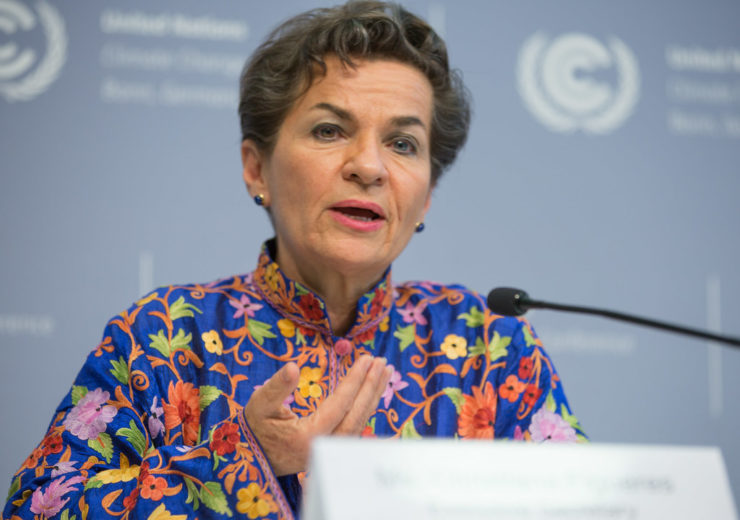The former UNFCCC executive secretary wants countries to develop green economic recovery plans for a post-coronavirus world

Christiana Figueres was executive secretary of the UNFCCC from 2010 to 2016 (Credit: Flickr/UNclimatechange)
Market forces will naturally propel renewable energy ahead of fossil fuels after the Covid-19 crisis, according to global climate change expert Christiana Figueres.
The Costa Rican diplomat, a former executive secretary of the UN Framework Convention on Climate Change (UNFCCC), believes the unpredictable prices of oil, gas and coal mean investors are now favouring power sources like solar and wind.
She called for policymakers and business leaders to think long term when assessing how to restart economies in a sustainable fashion once the pandemic subsides.
Speaking to NS Media Group’s energy editor-in-chief Philippa Nuttall Jones at the New Statesman conference titled Remaking the world after coronavirus: A global policy forum, she referenced an International Energy Agency (IEA) report that said renewable energy has been most resilient power source during the Covid-19 crisis.
It forecast global capacity to increase by 6% this year, although its growth for 2020 and 2021 combined is expected to be 10% lower than predicted before the pandemic due to financial challenges, supply chain disruption and lockdown measures.
“The fact is, even before Covid-19 we’ve seen a constant decline in demand for oil and gas,” she said.
“We’re seeing an increase in demand as a trajectory for renewable energy because of several reasons.
“It’s an entirely predictable cost of fuel – that’s a big fat zero because when did the sun or wind ever send us bills for using their fuels? Prices will only continue to decrease, which we could never say for fossil fuels.
“Fossil fuels have predictable costs for the extraction but not predictable prices on the market.
“We’ve experienced, and been victims of, the constant utilising and eternal unpredictability of the fossil fuels on the market.”
Christiana Figueres says investors increasingly see renewable energy as a safe bet
The share of renewables in global electricity generation jumped from 26% to 28% between the first quarters of 2019 and 2020, according to the IEA’s Global Energy Review 2020.
While coal and gas represent close to 60%, their dominance in the mix has gradually receded, with global coal demand falling by 8% and natural gas consumption dropping by 3% in the same period.
Exploring the perception of investors, Figueres said the decreasing public tolerance of hydrocarbons from a social and environmental standpoint – along with the increased reliability of renewables – had left fossil fuels as “stranded assets”.
“It means most of the fresh financing is going into renewables,” she added.
“A quarter of the global electricity matrix is already renewable and it could be 50% by 2030 – or even more because of Covid-19.
“That growth is something fossil fuels just can’t compete with. We’re seeing the slow but steady decline of fossil fuels on the market and on the grids, and the steady but exponential increase of renewables on the grid.
“In order to increase that, it definitely needs grid optimisation via an overlap of AI and digitalisation in electricity structures, but all that is already happening.
“It also needs a huge amount of investment into batteries, which have come down in cost because of the investments.”
Covid-19 presents an opportunity – but green economic recovery plans are required
Despite continued progress, the UN diplomat was keen to point out the energy industry was still far away from achieving decarbonisation.
Instead, she believes Covid-19 could offer an “opportunity” for the world to tackle climate change by implementing green recovery plans – including new green energy jobs and more investment in national train networks like an American version of the Japanese bullet train – when restarting economies brought to a standstill by lockdown measures.
She highlighted how the 8% reduction in carbon emissions that has been forecast for 2020 by the IEA – brought about during very unusual times – is still only just above the 7.6% cuts required every year until 2030, as recommended by the UN Environment Programme in order to stay under the 1.5C ceiling on temperature rises that scientists say is necessary to avoid disastrous consequences.
Reflecting on more IEA research that suggested a 13% decline in renewable power capacity growth for 2020, Figueres said: “It doesn’t mean we’re on the other shore yet. We’re definitely in an energy transition but all transitions are messy.
“When I provide these statistics about the growth of renewables, someone else could show me figures that say we’re still reliant on coal, oil and gas.
“Both are true because we’re in that intersection that’s typical of any transition, where the old goes down and the new is coming up.
“What we’ve learned from Covid-19 is we totally have to accelerate anything that gives us better resilience and health, not less.”
Asked what her one message for business leaders and policymakers would be, she replied: “Think long term. Yes we have to get the jobs back and get the wheels of the economy moving forward, but at the same time we need to think long term.
“Where do we have to be five and 10 years from now? That long-term thinking will inevitably lead you to sustainability and the right choices today.”
